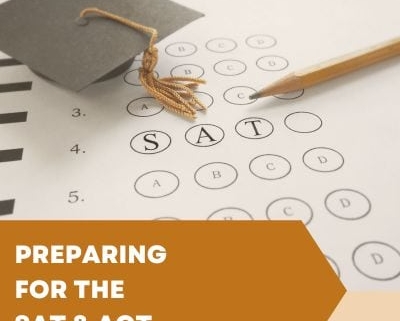Preparing for the SAT & ACT
The SAT and ACT are two standardized tests used for college admissions in the United States. Both tests assess students’ academic readiness for college, but they have some key differences. Read on to learn more about preparing for the SAT and ACT exams.
Key Differences Between the SAT and ACT
- Sections: The SAT has three sections: Reading, Writing and Language, and Math. The ACT has four sections: Reading, English, Math, and Science.
- Science: The ACT has a separate science section, while the SAT does not.
- Scores: The SAT scores range from 400 to 1600, while the ACT scores range from 1 to 36.
SAT Structure
|
Component |
Time Alotted (Minutes) | Number of Questions | Time per Question (Seconds) |
|
Reading |
65 | 52 | 75 |
| Writing & Language | 35 | 44 | 48 |
|
Math |
80 | 58 | 83 |
ACT Structure
| Component | Time Alotted (Minutes) | Number of Questions | Time per Question (Seconds) |
| English | 45 | 75 | 36 |
| Mathematics | 60 |
60 |
60 |
| Reading | 35 | 40 | 52.5 |
| Science |
35 |
40 | 52.5 |
| Writing (optional) |
40 |
1 essay |
Students who may benefit from taking the SAT
- Students who are strong in reading and writing. The SAT has a heavier focus on reading and writing than the ACT.
- Students who want more time to complete each section of the test. As you might have noticed in the tables above, the SAT provides more time per question than the ACT does.
- Students who are applying to colleges that prefer the SAT. Some colleges have a preference for the SAT over the ACT, so research the colleges you are interested in to see if they have a preference.
Students who may benefit from taking the ACT
- Students who are strong in math and science. The ACT has a separate science section, which can be a good option for students who are interested in science-related fields. However, advanced knowledge of science is not necessary. The science section of the ACT will measure data interpretation, scientific investigation, and model evaluation.
- Students who are applying to colleges that prefer the ACT. Some colleges have a preference for the ACT over the SAT, so research the colleges you are interested in to see if they have a preference.
Ultimately, the best way to decide which test is right for you is to take a practice test of each. This will help you get a feel for the format and difficulty of each test and decide which one you are more comfortable with.
Preparing for the SAT & ACT
- Take practice tests. Practice tests will familiarize you with the format of the test, the types of questions that are asked, and the time constraints. There are many official and unofficial practice tests available online and in bookstores.
- Review your weak areas. Review the questions that you missed after you take a practice test. This will help you identify your weak areas and focus your study efforts on those areas.
- Develop good test-taking strategies. There are a number of test-taking strategies that can help you improve your score on the SAT or ACT. These strategies include managing your time effectively, eliminating answer choices, and reading carefully.
- Tutoring: Consider hiring an SAT or ACT tutor for personalized help and attention. A tutor can help you identify your weak areas, develop good test-taking strategies, and practice answering questions. When it comes to the SAT and ACT, it isn’t always a matter of what you know, but how you approach the questions. A tutor will prepare you for the tricky questioning that often appears on these tests.
Sign Up for Test Prep Tutoring Today!
Learn more or schedule your first session by calling or emailing us today.



